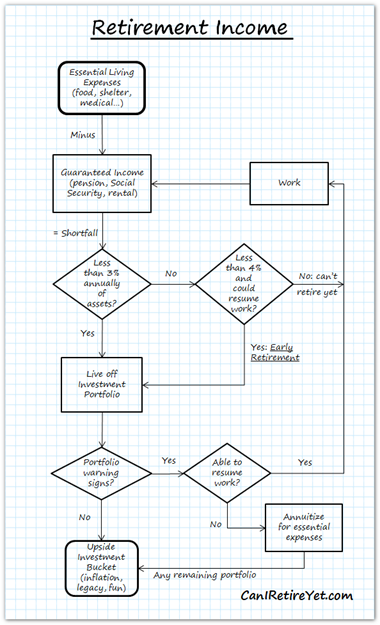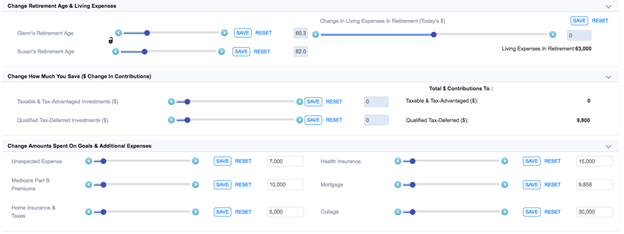Key Points
- A number of young Americans have begun trying to save as much as they can for several years so that they can retire early--very early, in some cases.
- Living frugally and purposefully is admirable, but leaving your career at a young age is not something to be undertaken without a lot of thought.
- Putting your retirement plan through its paces--and not just relying on a "safe" withdrawal rate for the rest of your life--is the very least you should do before embarking on this journey.
The FIRE (Financial Independence Retire Early) movement is getting a lot of press lately (enough to generate some backlash in fact). In case you're not familiar with FIRE, the basic gist is that younger people spend some number of years saving and investing as much of their income as possible--sometimes in the 70% range or more--and then living frugally (though not austerely, as they are quick to mention) for probably the remainder of their lives. In doing so, they are able to stop working full time far earlier than most people and pursue other interests (which often include some income-producing ventures).
Is FIRE the new "tune in, turn on, drop out?" Yes and no. One thing about the "R" in "FIRE:" A lot of FIRE's adherents don't think of retirement in the traditional sense of the word, where you are out on a beach or a golf course half the time. Depending on the person or family, it's not really retirement at all--and the people practicing it freely admit this.

It's the "FI" part of the acronym that matters most to these folks: The freedom to do what you want--and to take some risks--because you have the financial independence to do so. You have saved, done the math, and know that you can try something new without fearing the loss of income that will result from leaving your career. Worst case, you figure you could pick up a part-time job--maybe even one well beneath your abilities and earning potential--and cover all or most of your day-to-day expenses without drawing down much from your investments.
If you didn't have the savings, you would never try this. But because you do have the savings, other worlds open up to you.
Dousing the FIRE
We're conflicted about FIRE. On the one hand, frugality is an underappreciated and powerful thing. A movement that inspires people to save money, consume less, and lead a more conscious life--what could be bad about that? Getting off the hamster wheel and spending more time living? That sounds pretty good.
But we do have some concerns. Here are a few of them.
A big bear market. We'll assume that people on this path have accounted for the potential for a bear market (or two or three) in their plans. And we'll even grant that they might be able to weather it financially if they stay the course.
But will they be able to stay the course? Bear markets can wreak mental and emotional havoc on even the most seasoned investors. Very few FIRE proponents have been through a bear market since making the leap; indeed, some were barely into their 20s in 2008 when it all came crashing down last time.
Here's a rare case of a FIRE blogger who was around as an early retiree back then. He lost $750,000 on paper--and nearly locked in those losses by selling. What would you have done in his shoes?
In their defense, the FIREd could actually be in a better position to withstand a bear market than most Americans. After all, they're the ones used to living on a budget, and most of them have a seven-figure portfolio. If a bear market hits and they lose 40% of that, they're still probably going to be better off than the average family.
However, they'll also be unemployed (or underemployed), and possibly will have been so for a long time just when full-time work is hard to come by. Suddenly, the opportunity cost of not maximizing income when the going was good (while the economy was booming) might loom pretty large. Just as you can't get the years back working, you can't get the years back not working. There are two sides to the coin.
In any case, the financial issues are separate from the emotional ones. If you haven't been through it, you don't know how you'll react.

With WealthTrace, you can put your retirement plan though a simulation of a 2008-like bear market a certain number of years from now. . .

. . . . and see what the effect of a year's worth of the asset class' returns from that bear market would do to the probability of success of the plan (as measured by a Monte Carlo simulation).
Flexible spending is not for everyone. FIRE-ers will tell you that they plan to scale back on their spending when times are tight, and live a little--travel more, for example--when times are good.
A variable withdrawal strategy is great in theory, and it's a pretty common way to make sure a traditional retirement plan will work. But self-knowledge is important here. Are you the type of person that could handle that kind of uncertainty for potentially long stretches of time? It's one thing for a traditional retiree in their 60s or 70s having to skip taking a cruise for a year or two. But what if you're in your 30s or 40s and raising kids? Where do you decide to cut spending?

WealthTrace allows you to vary anticipated spending rates in retirement, even on a year-to-year basis.
The past is not the future. The 4% Rule, asset class return projections, Monte Carlo simulations, WealthTrace's bear market simulator shown above--the value of all of these, and probably every market indicator you can name, is predicated on the idea that the past repeats itself.
In the big picture, the past generally does repeat itself. But the details change, and for early retirees, those details matter.
Take the 4% Rule, which essentially postulates that retirees with a 30-year time frame should be able to withdraw 4% of their portfolio annually and do just fine, in any kind of market environment. It's based on data going back to 1925, and was considered for a while to be a bulletproof assumption.
No more. It's still a good starting point for sure, but in this era of low bond yields, 3% is a lot safer. That might be tough news for people some years into an early retirement using what was previously assumed to be a safe number.
It could be that in 10 years we'll be talking about a 5% rule, or a 2% rule. The point, though, is not to rely exclusively on these history-based metrics. Because you, right now, are living through a period that will one day be some other stock market researcher's history. And once that researcher has compiled her report based on that history, the results won't be of much use to you. It will be too late.
 WealthTrace can help you get to a portfolio withdrawal rate you're comfortable with.WealthTrace can help you get to a portfolio withdrawal rate you're comfortable with.
WealthTrace can help you get to a portfolio withdrawal rate you're comfortable with.WealthTrace can help you get to a portfolio withdrawal rate you're comfortable with.
Your 35-year-old self will be different from your 60-year-old self. Yes, we know that is about as obvious as can be. But specifically as it relates to early retirement, it's important to consider what could happen if your tastes change, or if your spouse's tastes do.
FIRE adherents will tell you they don't feel like they're sacrificing, even living on what seems like a tiny amount of money, and that it's worth the trade-off for the freedom they get in return. We mostly believe them.
But what if you're comfortably living the FIRE dream out in the sticks where the cost of living is low, and you decide you're tired of it? You're 33 now; what if you want something nicer for yourself than a $30,000-a-year budget when you're 43? Have you cut yourself off from ever being able to move out of Podunk, NC, or making monthly Sam's Club runs to make early retirement work?
Almost everything is a trade-off. Maybe you'll just cross that bridge when you get there; maybe finding out that you're not able to "upgrade" your lifestyle will just make you shrug and decide that it was all worth it since you didn't have to commute to an office job all those years. On the other hand, maybe dropping out of the full-time workforce entirely in your 30s will have seemed pretty extreme.
Live Like You Will Be FIREd
It's not fair to put all of FIRE in one basket. Depending on the sites you read, you might start rolling your eyes at one more 30-something who has a moderately (or wildly) successful blog and has gotten lucky with a couple of rental properties and decides to pack it in, professionally speaking, and preach the early-retirement gospel. They load up their sites with affiliate links, refer to earning airline points with a credit card as "travel hacking" and doing odd jobs around the house themselves as "insourcing," and can be remarkably thin skinned about anybody who is skeptical of what they're doing. It's easy to start feeling dismissive.
On the other hand, there are a lot of smart, thoughtful (and funny) people at the forefront of this movement. They are honest about their mistakes and reflective about what they're sacrificing in order to make this work. You can learn a lot from them.
A lot of what we've brought up in this article has to do with being afraid of what might happen down the road. You constantly can't live in fear of what might happen, of course; otherwise you would lead a pretty miserable life.
You can, however, test the effect of a potential disaster, changes to your lifestyle you might want to make down the road, or even unknowable financial events on a plan. If you're going to go this route, that's the least you should do.

WealthTrace can show you what adjustments to inputs on your plan could do to its probability of succeeding.
In the end, most people aren't going to retire at 33, of course. But if they live like they want to do that (or at 43, or some other early age) by saving more and spending less, they'll have a good chance of being able to retire early. There's nothing novel or trendy about that idea, but it's a lot better than most people can hope for, and certainly a lot better than working until you drop.
What trade-offs will you need to make to retire early? WealthTrace can help you find out. See how making small changes to savings can have a big effect on the probability of your plan succeeding. Use a free trial of our personal financial planning software to find out more.